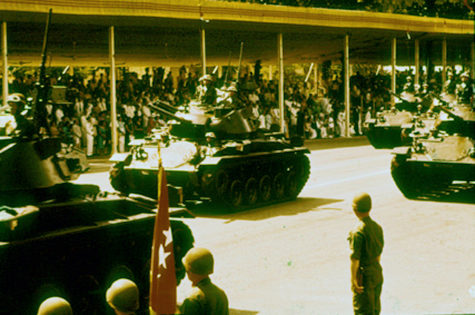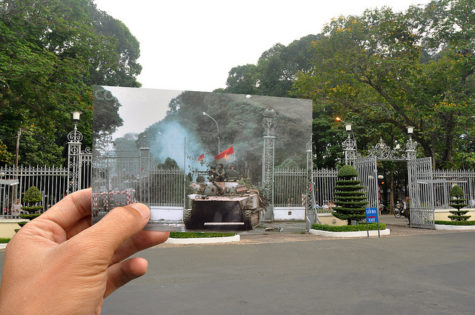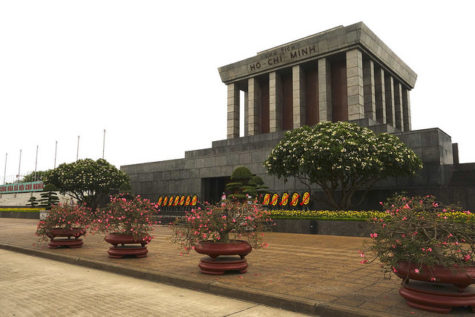Vietnamese Holi-“Days”
On September 2nd 1945, President Ho Chi Minh read the Declaration of Independence of Vietnam. If you’re wondering why you had a day off last Friday, September 2nd, it’s because 71 years ago, the country you currently live in was declared the Democratic Republic of Vietnam.
There is a curious situation occurring in UNIS, in which some of us don’t really know why we enjoy holidays; yet, most of us do not bother to find out. Despite living here for several years, not many of us understand why we get “random” days off, or know of that many historic events in Vietnam. As part of being in a United Nations school, we should all educate ourselves with the events and dates that made Vietnam the flourishing country that it is today. To make things easy for everyone, I’ve researched and compiled a short list of major Vietnamese national holidays with the theme of “independence”, and explain briefly the meaning behind these holidays.
During World War II, the Japanese occupied Vietnam along with the rest of Indochina, yielded by the Vichy France government. When the war ended, the Vietnamese coalition called the Viet Minh commenced the “August Revolution” to take back control of the country. On September 2nd 1945, leader of the Viet Minh, president Ho Chi Minh – the famous (and infamous) “Bác Hồ” – read the Declaration of Independence at the Ba Dinh Square and established the democratic republic system in Vietnam.
It is thanks to this declaration, which reads, “All men are created equal; they are endowed by their Creator with certain inalienable Rights; among these are Life, Liberty, and the pursuit of Happiness”, that has allowed Vietnam to become the country that it is today. You might just had a moment of deja vu reading that – and you should! The Vietnamese Declaration of Independence drew inspiration from the United States Declaration of Independence – which goes to show that ideological differences may not be so different after all.
Interesting fact: Ho Chi Minh supposedly died on the September 2nd 1969; however, the government announced his death to the country September 3rd, so that his death did not clash with the celebration for Independence Day. Neat – if not a little depressing.
Interesting fact #2: Ho Chi Minh isn’t his real name. It’s not his second name. It’s not even his third name; in fact, his birth name is Nguyen Sinh Cung, and throughout his life, he’s been known as Nguyen Tat Thanh, Van Ba, Nguyen Ai Quoc, Ly Thuy, Thau Chin, Sung Man Ch’o, Lin, Ho Quang, Gia Thu, and finally, Ho Chi Minh. Most of those names are fake identities; however, you’d hear some of the more official names still used a lot in Vietnam.

2. Capital Liberation Day (10/10/1954)
After Vietnam was declared Independent in 1945, the French returned to Vietnam to reassert their colonial dominance in 1946, beginning First Indochina War. Slowly but vigorously, the Viet Minh defeated the French in 1954, and the war was ended by the negotiation of the Geneva Accords, which granted Vietnam its independence once more. However, the terms of the accords divided the country in half at the 17th parallel, setting the stage for the Second Indochina War, known commonly as the Vietnam War – or in Vietnam, the American War.
Interesting fact: The north followed a communist government, supported by the USSR and China during the Vietnam/American War; whilst the south followed a democratic system, supported by the US during the Vietnam/American War. The country was split in half at a latitude as well – in an eerily similar fashion to the result of the Korean War. Some might say Hanoi could’ve been a second Pyongyang if circumstances were different – but those are mere speculations and shower thoughts.
Interesting fact #2: The last coincidence that I’d spring on you is that the city of Hanoi was founded as the capital of Dai Viet – ancient Vietnam – in 1010. Hanoi was liberated in 10/10; and to commemorate the 1000th anniversary of Hanoi, a celebration was held on 10/10/10.

3. Liberation of the South Day (30/4/1975)
Since 1954, the South and the North of Vietnam was plotted against each other due to their opposing beliefs – but mostly by their giant allies who tended to fight proxy wars back in the Cold War days. The Republic of Vietnam (South) refused to participate in the election to unify the country, saying that it did not sign, and therefore was not bound, to the Geneva Accords. As means to reunify the country, the Democratic Republic of Vietnam (North) had to use force from communist allies to fight against the military forces of South Vietnam. When the Viet Cong (North) defeated the Republic of Vietnam (South) in 1975, the two parts of the country were reunited into the Socialist Republic of Vietnam. This day marks the day the South was liberated, in the true sense of the word; North Vietnamese tanks rolled into the palace grounds, and South Vietnamese leaders hitched a ride on helicopters to leave Saigon.
4. Labour Day (1/5)
After Reunification Day (30/4) comes Labour day (1/5) in Vietnam, in which the country’s services and institutions are closed. Though not a thoroughly Vietnamese date of significant importance, it is right next to Reunification Day; adjoining with the reunification day, people will have 2 consecutive days off, and sometimes when it falls on a weekend, it will make for 4 consecutive days off. On these days, Vietnamese people travel back to their countryside hometown or visit tourist attractions around Vietnam. The Vietnamese are reminded of the people and the hard workers who sacrificed themselves for the country, and so they return to their ancestral homes to give their thanks and celebrations to those who sacrificed.
And there you have it – the Independence days of Vietnam. Now that you’re educated with the events behind these holidays, spend your holiday the most meaningful way that you can and celebrate the moments that you live in now, knowing that a lot has happened in the past in order for us to enjoy the life that we have today!



